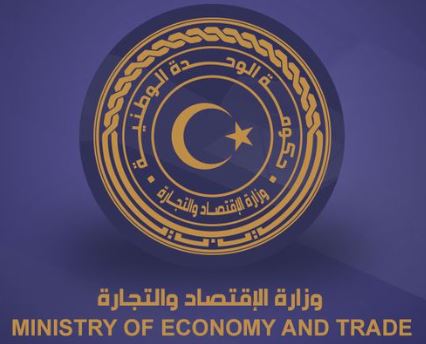The Tripoli based Libyan Minister of Economy and Trade, Mohamed Al-Hwej, held a meeting at the Ministry’s Tripoli office today, in the presence of the advisory team and the Director of the Internal Trade Department, within the framework of following up on the mechanisms of regulating import operations through banking instruments, and preparing the import budget to ensure that the needs of the local market are met according to priorities.
Small traders call for support with easier payment mechanism
The meeting addressed the most prominent challenges facing companies and suppliers in completing import procedures through commercial banks, including difficulties related to the use of approved banking instruments. Several representatives of companies and traders also called for the Ministry’s intervention at the Central Bank of Libya to facilitate procedures and support small traders, by activating electronic means of payment and organizing import operations to achieve competitive justice in the local market.
Harmonizing monetary, financial and trade policies
For his part, the Minister confirmed that the Ministry has developed an integrated vision to regulate the import budget, and that it is in the process of presenting this vision during an upcoming meeting that brings together the Governor of the Central Bank of Libya, the Minister of Finance, the National Economic and Social Development Board (NESDB), and the President of the General Union of Chambers of Commerce, Industry and Agriculture. This vision aims to harmonise monetary, financial and trade policies in a way that serves the national economy, strengthens the dinar, and helps the Central Bank in implementing its policies for economic reforms in line with the three financial, commercial and monetary policies.
Analysis: Tension between the CBL and the Ministry – Achieving a balance
It must be noted that there exists, and has existed for decades, a fundamental tension between the aims of the Central Bank of Libya and the Economy Ministry.
Monetary control
On the one hand, the Central Bank of Libya wishes to achieve monetary control, the reduction of the cash economy and inflation, and defending the foreign exchange value of the Libyan dinar through limiting imports to those transacted through banking instruments such Letters of Credit (LCs). LCs force importers to deposit their cash into their bank accounts.
Smooth supply of goods to keep prices down
On the other hand, the Economy Ministry aims to ensure the smooth flow of the import of goods to supply the market, including enabling the large number of small importers who operate largely using cash through the foreign exchange black-market.
Typically, these smaller importers would react to short-term gaps in the market or offers of discounted goods abroad to strike fast deals. They would be traders who would buy goods in neighbouring Tunisia or Egypt and quickly transport them by road across the borders.
Another important sub-category are fresh fruit and vegetables importers buying in cash from Egyptian or Tunisian farmers/middlemen who do not use the bureaucratic and slow banking system as a mode of receiving payment.
Redistribution of wealth, helping SMEs, creating enterprise and jobs
Moreover, the strata of cash-paying importers is usually made up of SMEs that the government does not have to find jobs for. They are an enterprising group of small businesses who create jobs. A complete clampdown on their activities would lead to other possible economic and social negative consequences. It would be seen as an attack on the poorer in favour of what is referred to in Libya as the ‘‘fat cats’’ that open LCs in the millions.
The CBL policy has failed before
The Central Bank of Libya seeks to stop imports that are not paid for through banking instruments in its fight against the black-market and its defence of the FX rate of the dinar. However, this policy has been attempted in the past – unsuccessfully. Such a complete shutdown had led to a shortage in the supply of goods, the hoarding of goods and sharp price rises. The price rises had resulted in political pressure on the government of the day and a relenting and reversal of the policy.
There are fundamental flaws in Libya’s monetary and financial system leading to distortions in the market and the economy. The independent-from-the-government Central Bank of Libya and the government must arrive at a workable compromise solution whereby goods arrive regularly and smoothly in the Libyan market while the negative effects of the FX black-market and inflation are negated, and the weak dinar is defended.









